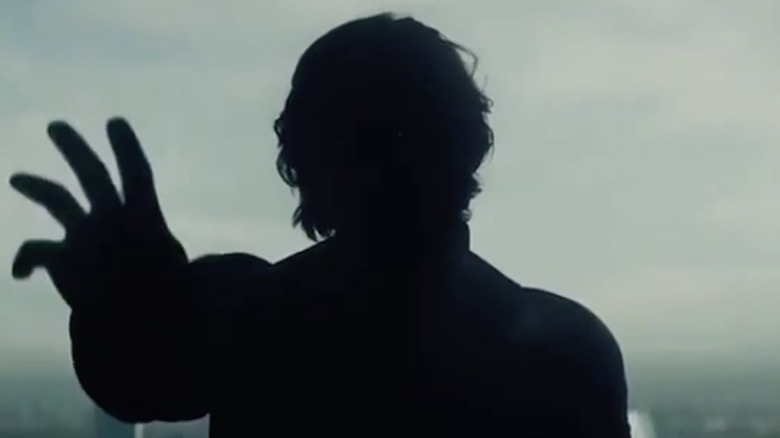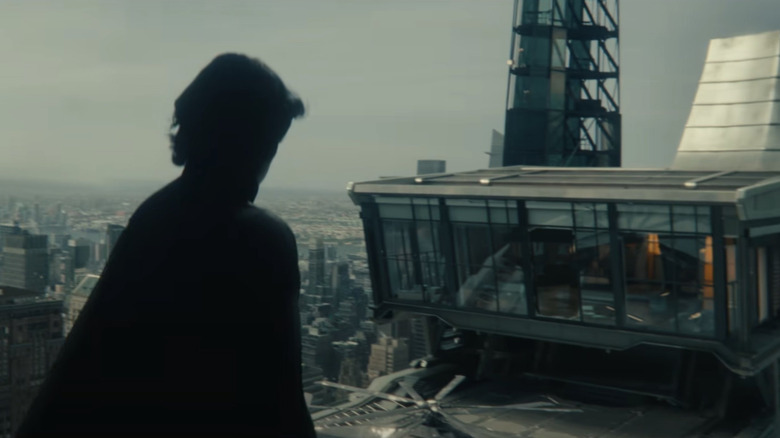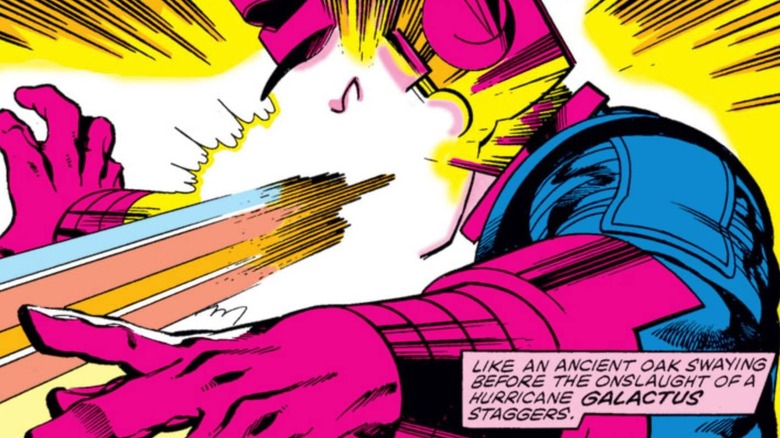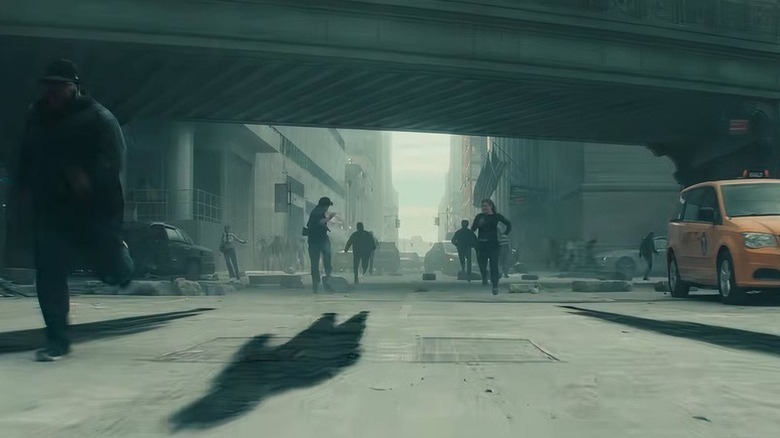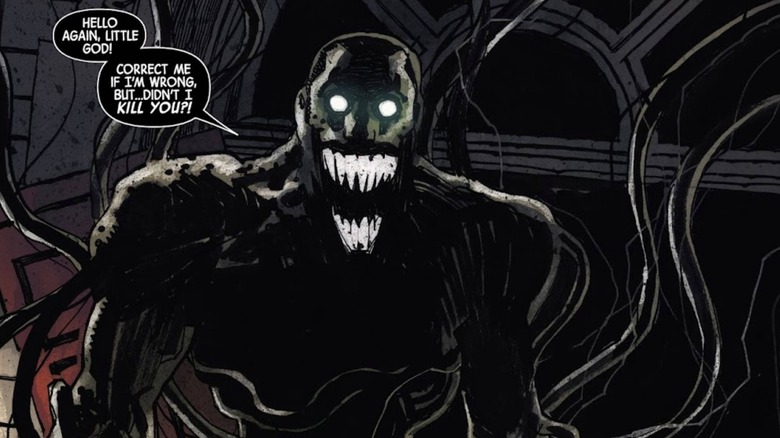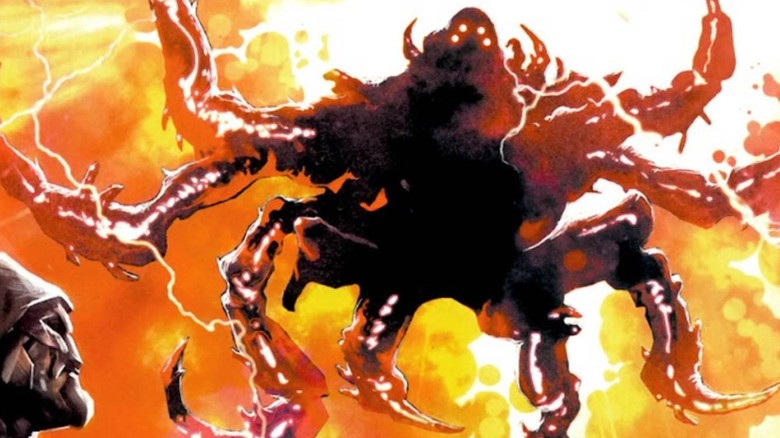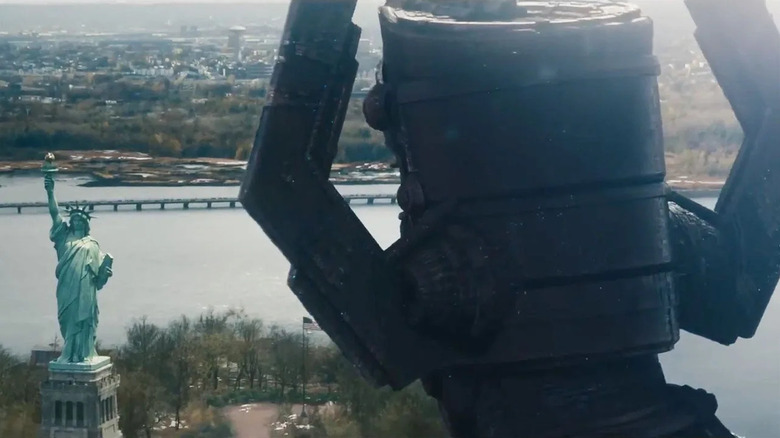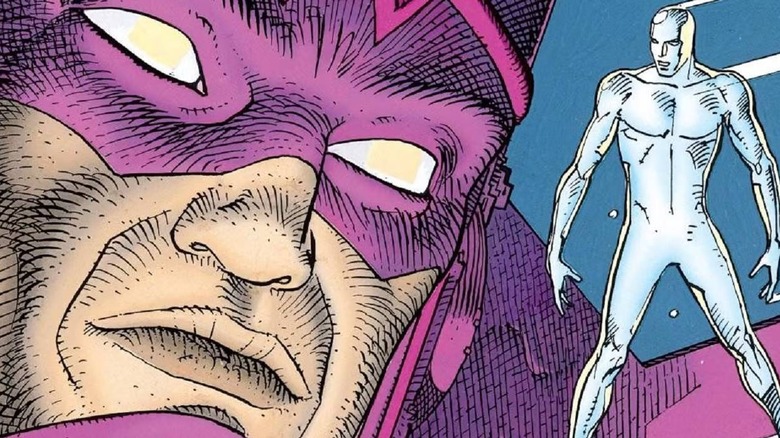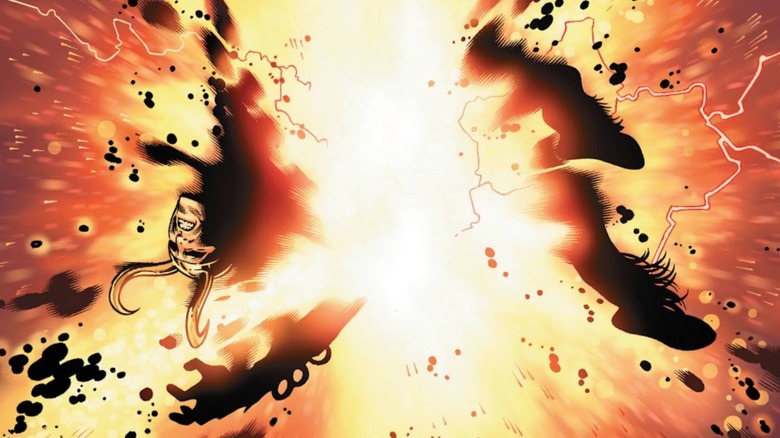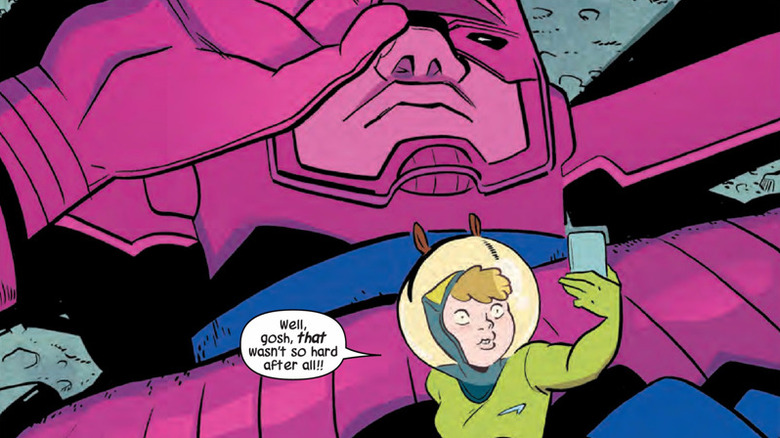9 Reasons The Void Is More Terrifying Than Galactus
Contains spoilers for "Thunderbolts*"
Galactus has long been considered one of the most powerful supervillains in comic book history, and it's easy to see why. He's a cosmic force of pure destruction who wanders the universe looking for planets to consume. That means it's likely that Galactus has ended the lives of trillions (if not quadrillions or even quintillions) of life forms. And general audiences will see him once more terrorize the big screen in the forthcoming "The Fantastic Four: First Steps," as played by Ralph Ineson. But even though Galactus could be seen as even more terrifying than Thanos (Josh Brolin), there's one Marvel entity who's maybe even more horrific than the Devourer of Worlds.
And it just so happens this entity recently made his big screen debut in "Thunderbolts*" — the Void (Lewis Pullman), a manifestation of Robert "Bob" Reynolds' darkest thoughts and the counter to his heroic persona, the Sentry. This is a relatively new addition to the Marvel mythos, as Bob, Sentry, and the Void all made their first Marvel Comics appearance in 2000's "Sentry" #1 from writer Paul Jenkins and artist Jae Lee.
The Void is an all-powerful, destructive force that can manipulate matter and shroud existence in a black cloud. It's nothing short of utterly terrifying, both in terms of its power set and how unkillable it is. Yes, the Thunderbolts (or New Avengers, as it were) subdue the Void in "Thunderbolts*," but they don't get rid of it entirely. It's still there, hiding within Bob, and once you learn more about this villain, you'll agree it's more than a match for Galactus.
The Void comes out of nowhere
In "Thunderbolts*," no one is aware of the Void until Bob loses control of his emotions. He then begins terrorizing New York City, sending everyone to a sort of shadow realm and clouding the city in darkness. This is basically the character's m.o. in the comics as well, as Bob Reynolds (with help from Doctor Strange and Reed Richards) needs to make the planet's population forget about the Sentry, himself included, so that the Void remains at bay. Otherwise, it can come out at a moment's notice and wreak unparalleled levels of havoc.
It's hard to call Galactus' arrival a good thing, but he does send a herald, usually Silver Surfer, to the planets he's about to consume. It may seem cruel because then the population has to live with the knowledge they're doomed until Galactus arrives to eat everything in sight. But this also gives the population a chance to collect themselves and figure out a way out of the situation. "The Fantastic Four: First Steps" trailer shows Silver Surfer (Julia Garner) warning the planet of Galactus' arrival, and the titular team gets to work figuring out a way to stop him.
Galactus gives populations a chance to defend themselves even though he himself is all-powerful and pretty tough to defeat most of the time. With the Void, you simply start seeing people around you turn into shadows, and it's already too late.
Galactus needs to eat planets to thrive
If Galactus has a weakness, it's that he needs to consume planets to maintain his powers. Galactus uses such vast quantities of cosmic energy that he needs to constantly eat planets to replenish himself, which means that if he goes a long time between meals, his power dampens. This is precisely what happens in "Fantastic Four" #243 from John Byrne, Jim Novak, and Glynis Wein. It still takes the power of the Fantastic Four, the Avengers, and any other heroes in the vicinity to stop Galactus, but they do prevent him from eating Earth by launching Ben Grimm, aka the Thing, into Galactus' face.
Meanwhile, the Void has no such limitations. Both it and the Sentry have the power of "a million exploding suns" (via Marvel), and it never appears as though they need to refuel at any point to maintain that capability. Theoretically, either one could wipe all of existence out without needing to stop and eat a cheeseburger.
That's not to say the Void doesn't have weaknesses. It seems to have a certain susceptibility to magic, allowing powerful magic users like Doctor Strange to put it into a pocket dimension where it can't cause problems for the main timeline. The Void can also be assimilated by Knull, as shown in "King in Black" #1 from Donny Cates and Ryan Stegman. But those weaknesses don't detract from how truly terrifying the Void is. Galactus just gets hungry and can no longer fight, which makes him relatable to anyone who's ever gotten "hangry" before.
The Void punishes people with fates worse than death
Galactus eating a planet is obviously a very bad thing, but when Galactus eats a world, usually by converting all of the life force on it into energy first and then devouring that, everyone presumably dies immediately. It's this life force that Galactus is after, which is why he doesn't eat planets that don't sustain any form of life. He's not literally eating the planet per se, but any life forms on it, so one could surmise this leads to quick deaths.
Let's contrast this to what the Void does. In "Thunderbolts*," it turns New Yorkers into shadows. When Yelena Belova (Florence Pugh) enters the Void, she's transported to her most traumatic memory, of her as a young girl causing one of her friends to die. We can assume that everyone who's turned into a shadow during the Void's rampage experiences something similar, also confronting their most painful personal memory. If the Thunderbolts fail in getting Bob to overcome his darkest thoughts, it's likely that all of those people would continue to exist in these realms and relive their worst memories over and over again, which feels like a fate far worse than death.
The Void has a similar power set in the comics with its infini-tendrils, which will excavate intensely traumatic memories from anyone who's impaled on them. Although the team saves the day in "Thunderbolts*" and everyone comes back, it wouldn't be surprising if they need a lot of therapy to unpack what they went through.
The Void can't be killed, just neutralized
It's very difficult for any comic book character to die and stay dead, but that especially holds true for the likes of Galactus and the Void. Technically, Galactus has died on various occasions; it's just a bad idea for him to do so. When Galactus dies, the entity known as Abraxas (a cosmic force of pure malevolence) emerges. Galactus' sheer existence in any given reality is enough to keep Abraxas at bay, which unfortunately means that Galactus needs to keep living because when Abraxas does unleash chaos, he's strong enough to kill hordes of Galactuses.
Even in death, Galactus is still terrifying, but the Void is an entity that is functionally immortal. Both the Sentry (after separating from the Void) and Thor throw the Void into the sun, and it always finds a way to come back. The best one can really do is contain the Void, which is what Doctor Strange helps with. He creates a pocket dimension within Bob's mind where the Void can reside but can't escape, but it doesn't do much good when Bob decides to embrace the Void and merge it with the Sentry.
The closest anyone has really come to killing the Void is Knull, the creator of symbiotes like Venom. Knull tries to kill the Void in "King in Black" #1, but instead, the Void submits to the eldritch god and assimilates into him to become a terrifyingly powerful creature. The Void can be subdued or transformed, but can never fully go away, meaning that the Marvel Universe heroes always have to be vigilant that it could return at any moment.
The Void could destroy the entire universe
To truly grasp just how far-reaching the Void's powers can be, it's vital to read "What If...?" #200 from Marc Guggenheim, Dave Wilkins, Dave Lanphear, and Lucio Parrillo. The issue takes a different look at the Siege of Asgard storyline, in which Sentry/the Void works on behalf of Norman Osborn. He sends the Void to destroy Asgard, killing Ares in the process and going up against the main Avengers, like Thor and Iron Man. Thor manages to win the day by defeating the Void and throwing its body into the sun.
A big reason why Thor is able to win, even barely, is that the Void is weakened by first fighting Ares. "What If...?" #200 considers what would happen if the Void kills Ares several days before the siege, having enough time to recover. He's then able to kill one hero after the next, ultimately betraying Osborn and gradually enshrouding the entire planet.
As Uatu the Watcher observes everything, he notes to one of his fellow Watchers, "With your Earth so consumed, it's only a matter of time before the moon and your home on it follow." This suggests that the Void's power will only continue to run out of control, consuming everything in its path. If it will soon take over the moon, it will likely keep spreading until the Void has engulfed every corner of this particular universe. Under the worst conditions, there would be nothing to keep the Void in check.
Galactus is more force of nature than entity of pure darkness
Galactus is definitely terrifying when he shows up to your planet, so it may not be much of a consolation that the entity at least serves something of a cosmic purpose. In addition to keeping Abraxas at bay, Galactus is responsible for creating a new universe once the old one dies. Galactus is the sole previous survivor of the Sixth Cosmos — the universe before the current one — giving him such immense power that he must eat planets to sustain himself. But Galactus is also supposed to help ensure life continues after the present universe ends.
Galactus amasses such massive quantities of cosmic energy that once he consumes every life-filled planet there is, he'll help kickstart the next iteration of the universe. That much is revealed in "Super Villain Classics" #1 from Stan Lee, Jack Kirby, Mark Gruenwald, and John Byrne, in which Galactus reveals, "For, no matter how many worlds I devour ... How many civilizations I destroy ... It is my destiny to one day give back to the universe — infinitely more than I have ever taken from it."
While Galactus is often considered a Marvel supervillain, he doesn't normally hold any malice toward the planets he consumes. It's a duty he maintains, and without Galactus, when this universe ends, it'll just be the end. Galactus must remain so that life can continue for eons to come. It doesn't make planetary destruction better, but it somewhat makes him a sympathetic character compared to the Void, which doesn't care about life at all.
Galactus is capable of mercy
One can reason with Bob or the Sentry, but the Void only wants to envelop everything in darkness. There's no good side to this entity; it's not on some noble quest with benefits beyond the comprehension of mortal minds. Galactus certainly has some of his own genuinely evil moments, like when his addiction to eating planets overtakes him and causes him to consume out of control. But there have also been moments where Galactus has genuinely shown mercy or compassion to lower life forms.
Arguably, the best example of this is how Galactus comes to acquire Norrin Radd as his herald, the Silver Surfer. Galactus seeks to consume Norrin's home world, Zenn-La, but Norrin says that if he spares Zenn-La and Norrin's loved ones, he will become Galactus' herald and find other planets for him to consume, which Galactus accepts. It's not long, however, before Silver Surfer is filled with existential turmoil regarding his compliance with the genocide of countless worlds, so it makes sense that he eventually lashes out, becoming one of the few Marvel characters who has single-handedly destroyed Galactus.
Galactus sparing a world from consumption isn't always done out of mercy. He reaches an agreement with the Fantastic Four to avoid consuming Earth, provided they don't use the Ultimate Nullifier — a rare device that could actually defeat Galactus — on him. Whether Galactus is capable of kindness or just looking out for his own skin, other life forms can reason with him.
The Void can overpower the most powerful Marvel beings
Based on "Thunderbolts*," the Void may not seem that terrible — all you have to do is enter Bob's psyche via the shadows he creates and give him a big hug to get him to overcome his darker impulses. That's assuming you're dealing with a Void that doesn't outright kill its opponents and that you'd even have enough time to reach Bob before the Void takes everything over. In the comics, the Void sometimes doesn't put people into shadows. It can use his powers of energy manipulation to destroy anyone and anything on an atomic level.
In "Siege" #4 from Brian Michael Bendis, Olivier Coipel, and Mark Morales, the Void uses its tendrils to completely disintegrate Loki, a literal god. "What If...?" #200 is perhaps the best example of how the Void could kill anyone it likes if it gets powerful enough. It annihilates Doctor Doom, Emma Frost, and the entirety of the Dark Avengers without breaking a sweat. Even in non-"What If" stories, the Void has no problem overpowering some truly intense adversaries.
This only scratches the surface of some of the Void's most shockingly impressive feats in the Marvel Universe. It's capable of breaking every bone in the Hulk's body, making it one of the few Marvel characters the Hulk is afraid of. Plus, in "Annihilation — Scourge: Beta Ray Bill" #1 from Michael Moreci and Alberto Jiménez Alburquerque, the Void literally tears a hole in the fabric of reality to link the Negative Zone with its universe. The Void has done things other villains could only dream of — and probably wouldn't even dare try even if they could.
Galactus has been beaten by some silly foes
Whether you think the Void or Galactus is more terrifying is really a matter of taste. They've both done horrific things, but the Void certainly has more of a mystique surrounding it. When it's defeated, it's by someone as powerful as Knull or Thor. "Thunderbolts*" doesn't even technically get rid of it, since it's still lurking inside Bob's psyche. Galactus definitely has more losses on his scoreboard by comparison, and some are downright silly.
Squirrel Girl is not only a female superhero who deserves her own movie, but she's also beaten some of Marvel's toughest bad guys, from Thanos to, yes, Galactus. In "The Unbeatable Squirrel Girl" #4 from Ryan North and Erica Henderson, Squirrel Girl gets Galactus to spare Earth by getting him to like her. He thinks it's funny that she defeated Thanos, and she leads him to an uninhabited planet filled with nuts he can enjoy instead. It may not be a K.O., but it definitely brings his intimidation factor down a few notches.
But that's not the Devourer of Worlds' only questionable defeat in the comics. "S.H.I.E.L.D." #1 from Jonathan Hickman, Sonia Oback, and Dustin Weaver shows how Galactus is initially turned away from Earth back in the 16th century by the likes of Galileo and Michelangelo. They construct a machine that utilizes the brain power of the world's scientists at the time to repel Galactus and spare Earth for the time being. Galactus has simply been around longer than the Void in the comics, so there have been more opportunities to deconstruct and defeat him. Maybe the Void will seem a lot less scary once Squirrel Girl beats it in a game of checkers or something.
